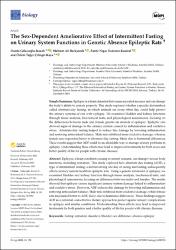The Sex-Dependent Ameliorative Effect of Intermittent Fasting on Urinary System Functions in Genetic Absence Epileptic Rats

Göster/
Erişim
info:eu-repo/semantics/openAccessTarih
2025Yazar
Gökçeoğlu Kayalı, DamlaBerkyürek, Mehmet Ali
Özdemir Kumral, Zarife Nigar
Çilingir Kaya, Özlem Tuğçe
Üst veri
Tüm öğe kaydını gösterKünye
Gökçeoğlu-Kayalı, D., Berkyürek, M. A., Özdemir-Kumral, Z. N., & Çilingir-Kaya, Ö. T. (2025). The Sex-Dependent ameliorative effect of intermittent fasting on urinary system functions in genetic absence epileptic rats. Biology, 14(2), 158. https://doi.org/10.3390/biology14020158Özet
Epilepsy, a brain condition causing recurrent seizures, can disrupt various body functions, including urination. This study explored how alternate-day fasting (ADF), a type of intermittent fasting, a diet involving one day of eating and fasting, subsequently affects urinary system health in epileptic rats. Using a genetic rat model of epilepsy, we examined bladder and kidney function through tissue analysis, biochemical tests, and physiological assessments, focusing on differences between males and females. The results showed that epilepsy causes significant urinary system damage linked to inflammation and oxidative stress. However, ADF reduces this damage by lowering inflammation and restoring antioxidant balance. Male rats exhibited more oxidative damage, while female rats responded better to ADF, likely due to hormonal differences. These findings suggest ADF as a potential, cost-effective dietary approach to protect against urinary complications in epilepsy and similar conditions. Understanding these effects may lead to improved treatments for both genders and a better quality of life for people with chronic diseases.
















